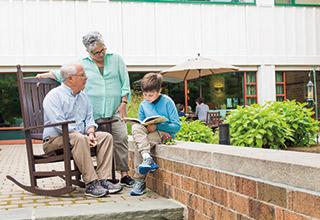Why Affordable Housing Is the Foundation for Supporting Older Military Veterans
Affordable housing with supportive services allows older veterans to shift their focus to their health and happiness.

When veterans return from service, many are welcomed home and greeted with gratitude. However, this “welcome home” is complicated for those facing housing instability, as they may not have a home to return to. While honoring their service is essential, so is acknowledging the real challenges many veterans face in securing and maintaining affordable housing throughout their lives.
Homelessness and housing unaffordability aren’t exclusive to veterans, but they are issues that affect them disproportionately. For aging veterans, homelessness presents additional health and safety risks. Nearly half of the nation’s veterans are 65 years or older — that’s 8.1 million older adult veterans! According to an article on the growing crisis of aging homeless veterans from the U.S. Department of Veterans Affairs, veterans experiencing homelessness aged 55 or older increased by 150% from 2010 to 2023.
Addressing other crucial aspects of well-being becomes an uphill battle without a safe place to call home. Older adults with stable housing often find it challenging to manage chronic conditions that can arise with aging. Without housing, managing those conditions is even more difficult.
True support means not only thanking veterans for their service but also ensuring they have a secure foundation for their future.
Challenges older veterans face
As veterans age, they can face challenges that affect their well-being. While younger veterans and the civilian population aren’t immune to these issues, older veterans often face unique circumstances that are worth acknowledging:
Health problems
Many older veterans experience chronic health issues that affect their quality of life. Nearly half of the veterans receiving care through the VA are 65 or older. Like their civilian counterparts, older veterans are at a higher risk for developing chronic conditions like diabetes, dementia, and heart disease as they age. And the U.S. Census Bureau has found that older veterans are more likely to have a functional disability than other older adults.
Older veterans also have higher rates of post-traumatic stress disorder compared to the civilian population. PTSD has been associated with poor functioning, depression, anxiety, and substance use disorders. But despite the value of seeking help, older veterans are less likely than younger ones to use mental health resources, even though they are just as likely to benefit if they do.
Social isolation
Social isolation and loneliness are common in older adults, and older veterans aren’t an exception. One report found that one in three adults ages 50-80 reported feeling isolated from others in the past year. Those with poor physical and mental health or disabilities that limit daily activities were particularly likely to feel lonely.
Census Bureau researchers recently found that veterans aged 65 and older were slightly less likely to be socially isolated than other older adults. A study found that 46% of non-veteran older adults had at least one isolation characteristic, compared to 43% of veterans.
But that statistic doesn’t tell the whole story. For starters, 43% of veterans feeling isolated is still an alarmingly high number! Additionally, military-specific and deeply personal factors such as trauma and PTSD can amplify older veteran’s feelings of loneliness and isolation.
Affordable housing with supportive services is the cornerstone of good care
In 2023, approximately 35,000 veterans experienced homelessness in the United States. That number encompasses both sheltered homelessness (e.g., living in emergency shelters, transitional housing programs, and safe housing) and unsheltered homelessness (e.g., living on the streets, sidewalks, or in cars).
That figure doesn’t reveal the complete picture. For instance, veterans who can’t afford their own housing and resort to couch-surfing or staying with family members and friends, or those who do have housing but are constantly struggling to make ends meet, aren’t included in this number.
The VA offers permanent housing assistance for veterans through the U.S. Department of Housing and Urban Development-VA Supportive Housing collaboration. The program combines HUD housing vouchers with VA supportive services to help veterans experiencing homelessness and their families find and sustain permanent housing.
If you or someone you know is experiencing homelessness, you can call the VA’s National Call Center for Homeless Veterans at 1-877-4AID (1-877-424-3838), which is available 24/7, to get connected to VA homeless programs. Other organizations, such as the New England Center and Home for Veterans, offer housing services to veterans facing the possible loss of housing.
Senior living organizations with affordable housing — especially those with supportive services — can play an important role in helping house older veterans. At Hebrew SeniorLife, we have developed close relationships with local VA representatives to do just that. Due to those close relationships, we have multiple residents who have come to Hebrew SeniorLife directly through the VA’s housing process, plus a number of veterans who found their way to us on their own.
Because we sit at the intersection of housing and health care, we can offer veterans even more support than they would receive in a traditional apartment. From our resident service coordinators to our social workers and care management nurses, among other health care supports, our affordable living communities with supportive services are a great place for veterans to put down roots.
Additional resources for older veterans
Several organizations, both nationally and in the Greater Boston area, also offer services and support to veterans. Some examples of these organizations include:
- Brighton Marine: Offers housing and financial support, health care, and additional assistance to veterans in the Allston-Brighton community of Greater Boston.
- Disabled American Veterans Massachusetts: Provides benefits counseling, claims assistance, and appellate representation for veterans with disabilities and their families navigating VA and state benefits.
- The Greater Boston Veterans Collaborative: A network of organizations, universities, and service providers active in Greater Boston focused on supporting the local military and veteran community.
- New England Center and Home for Veterans: Delivers a range of programs to help veterans who are homeless or at risk of homelessness achieve meaningful employment and independent living.
- Paralyzed Veterans of America: Provides services, advocacy, and research for veterans with spinal cord injuries or dysfunction.
- Wounded Warriors Project: Offers services to veterans who sustained physical or mental injuries during or after military service.
You can also uplift veterans in your own life. If you’re caregiving for an older veteran, AARP offers a military caregiving guide for veterans, service members, and their families that may help you navigate your caregiving journey. If you know someone who served who appreciates storytelling and reflecting on their service, consider offering a listening ear for them to look back on their military experiences.
Affordable housing options at Hebrew SeniorLife
Hebrew SeniorLife offers a variety of affordable housing options in the Greater Boston area. As New England’s largest nonprofit provider of senior health care and living communities — plus the only senior health care organization affiliated with Harvard Medical School — we are uniquely positioned to support the housing needs of the aging veteran population.
From the Simon C. Fireman Community in Randolph to Center Communities of Brookline, Jack Satter House in Revere, and Leyland Community in Dorchester, we offer vibrant, affordable housing designed to suit a range of lifestyles. To learn more, explore our communities online.
Join Our Community: Subscribe to the Hebrew SeniorLife blog for weekly insights on healthy aging and senior living.
Blog Topics
Learn More
Senior Living
Hebrew SeniorLife offers a variety of senior living options, including independent living, assisted living, and enhanced living. There are options for every lifestyle and budget.

The Best Health Care for Seniors
Hebrew SeniorLife is the only senior health care organization affiliated with Harvard Medical School. Members of our caregiving teams specialize in providing geriatric care, and they do so with care and compassion.





